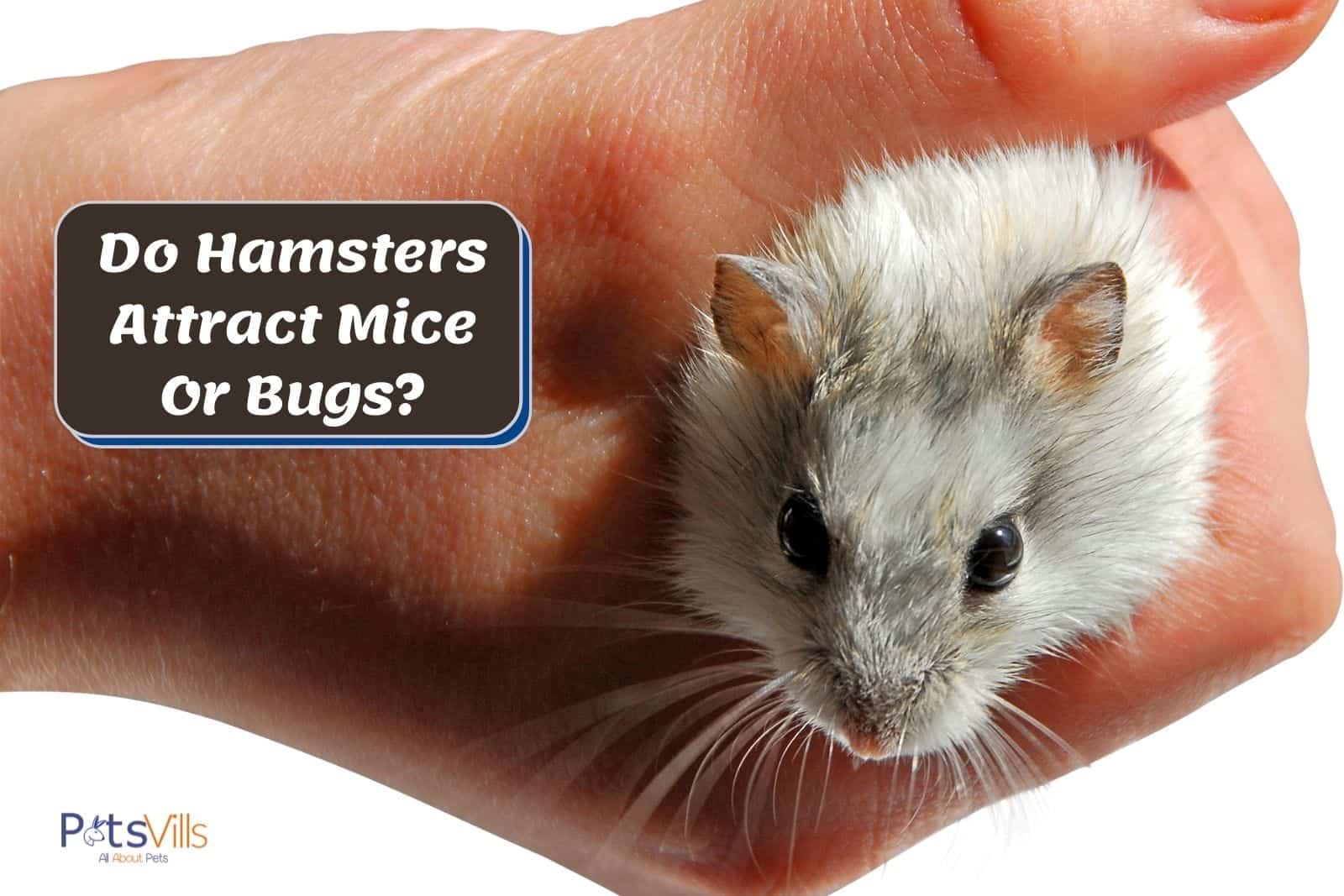One of my biggest worries before getting a hamster was worrying about them attracting other rodents such as mice and rats into my home.
Do Hamsters Attract Mice, Rats, Snakes, or Bugs?
No, It isn’t known for pet hamsters to attract animals into the house, and if they do it is unlikely to be the hamster’s fault.
Luckily enough, hamsters aren’t known for attracting other rodents and pests into your home.
If you now have pests after getting a hamster this article will explain exactly what you need to do and how you can prevent them.
Get Your Own Hamster Owner’s Handbook!
Table of Contents
Do Hamsters Attract Rodents Such as Mice or Rats?
It can be quite disturbing to think that your pet hamster may actually be attracting house pests. Think about it – rats and mice are rodents, just like hamsters. Why wouldn’t they pay a visit to meet their furry friends?
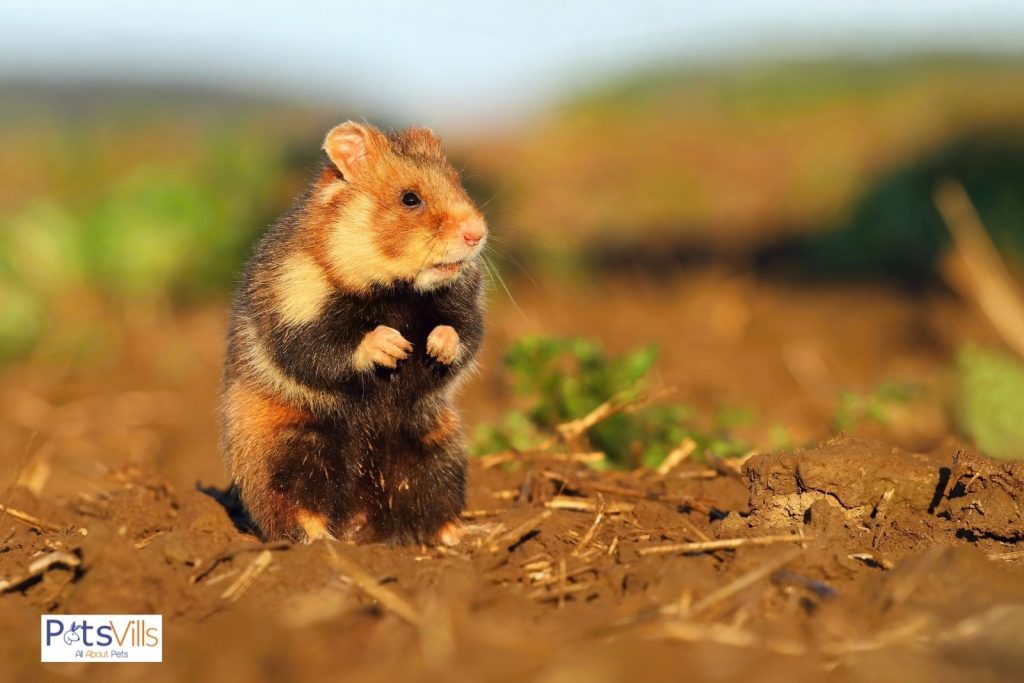
Luckily for you, there’s no reason to worry. Hamsters do not attract mice, rats, or any other rodents, for that matter. They don’t mate with other species of rodents either.
If you have a pet hamster or are considering buying one, go ahead and do so without any fear of a rat, mouse, or rodent infestation.
Provided that you won’t be dropping any rodent food around your house, you have nothing to fear.
Rodent Species Are Not Attracted to Each Other
Animals that attract each other do so by leaving familiar scents around them. These scents pull other animals to them, causing them to either hunt or socialize. Animals may attract each other to breed as well.
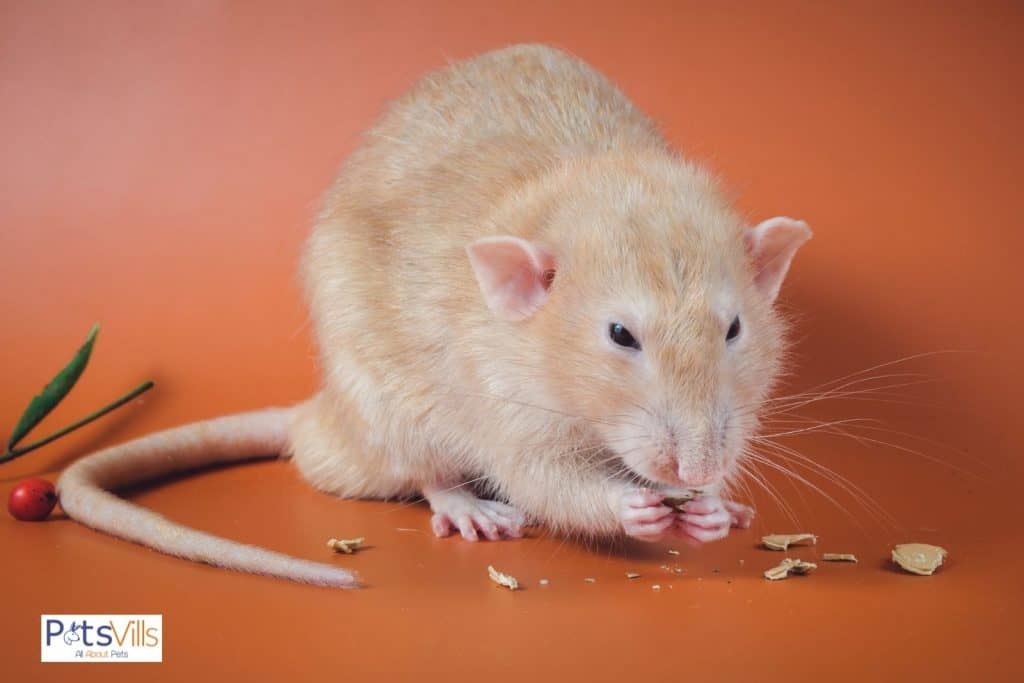
In the case of rodents, each species of rodents has its own distinct scent that is not attractive to other species.
They are indifferent toward the smell of animals that aren’t their own kind.
That is why, in most cases, different rodent species don’t try to locate each other by scent. Due to their very solitary nature, only rarely do rodents of different species stay together.
Caging two different rodents together is strongly discouraged since it can have deadly results. They are likely to start attacking one another and simply won’t get along.
This is the reason why hamsters do not mate with mice or rats.
Check: How Long Do Hamsters Hibernate?
Why Other Rodents Might Show Up
There are quite a few people who claim that their homes got infested with mice or rats after they kept a pet hamster. Though that may be true, hamsters are not to blame for it.
Firstly, any rodent that enters a house must have discovered a route of entry.
Houses with excessive cracks and crevices in their walls, windows, or doors are more prone to attract these unwelcome creatures. The paths of entry are to blame here, not hamsters!
Being the opportunistic feeders that they are, house pests like rats and mice often infest homes where they can find stray food. A large, uncovered trash can placed outdoors is a feast for these little creatures, as is a pantry full of unsealed food.
Some hamster owners aren’t big on hygiene. They might not clean their hamster cages often of the excess old food. Moreover, morsels of rodent food may land outside the cage due to their hamster’s activities.
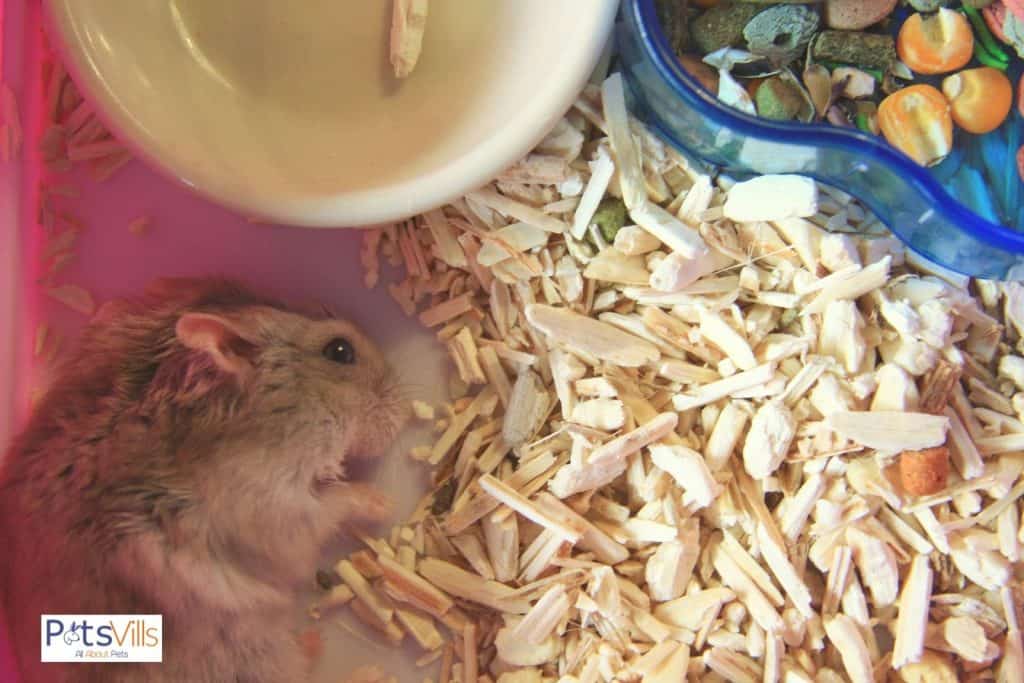
When all this mess of food isn’t cleared off, it may attract other rodents that are out to hunt.
Any mouse casually strolling by might feed on hamster food, and once this happens, it might come looking again with a few more friends!
Keeping your hamster’s cage and the area around it clean is important. If you’re used to carrying the cage from room to room, take care not to drop any food on the floor. Keep your stock of hamster food sealed as well.
Apart from hamster food, rats and mice like human food just as much! It is essential for you to clean up after your meals are over for the day.
Plumbing lines or walls of very old houses are another major target for infestation by rats, mice, and other house pests.
Areas, where the plumbing comes out of walls, are convenient for rodents to gain access to your home and need to be kept in check.
Once you take these precautionary steps, it is unlikely that you’ll face a rodent infestation.
Do Hamsters Like Other Rodents?
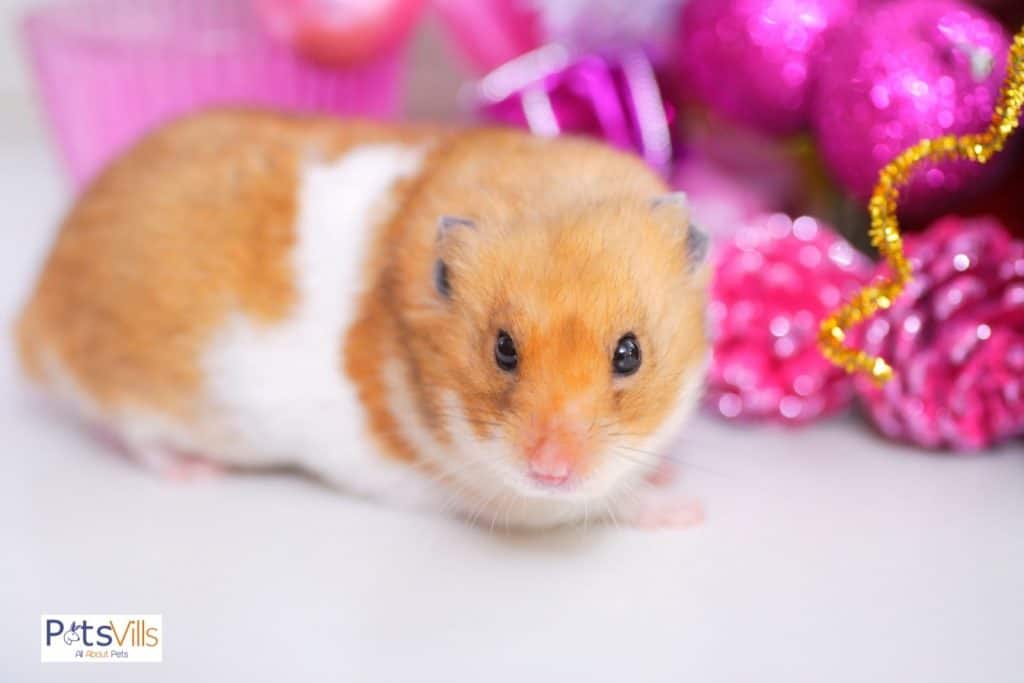
Hamsters aren’t sociable creatures. Let alone other rodents – even two hamsters of the same species will hardly tolerate each other in the same cage!
When forced to coexist in the same enclosure, they’ll often start biting or attacking each other.
Sharing is the last thing you can expect from a hamster. Also, being excessively introverted, they love spending plenty of time alone.
For Syrian hamsters, make sure you just get one of those to live in a single cage instead of a pair. They love solitude and are 100% opposed to living together.
In some cases, dwarf hamsters may be made to live together only if they are made accustomed to it soon after birth.
Do Hamsters Deter Other Rodents?
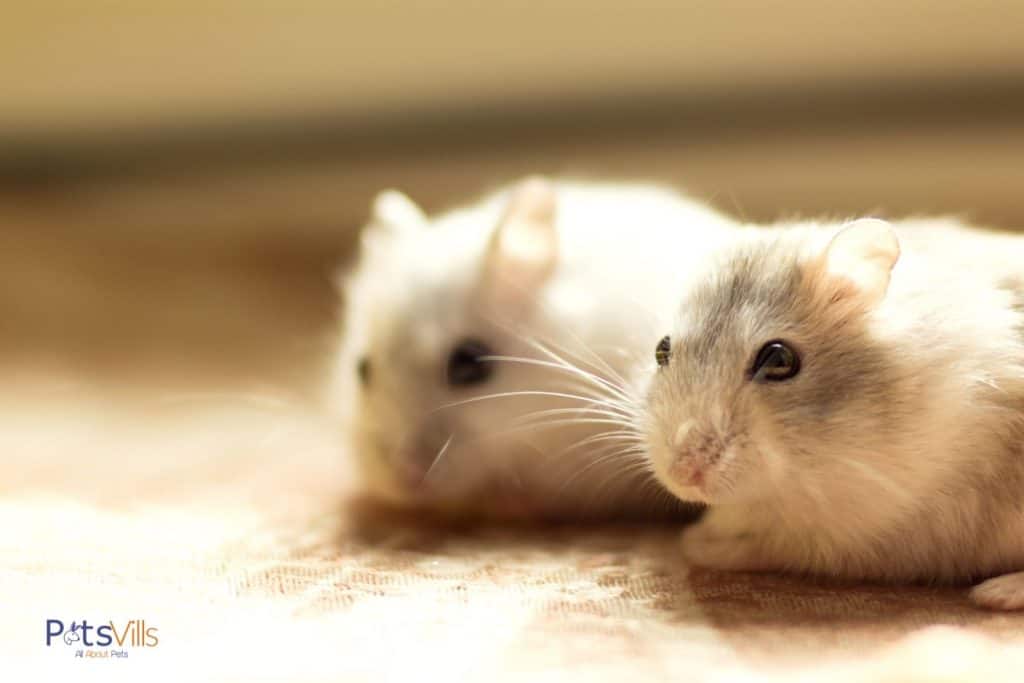
Now that you know hamsters definitely do not attract other rodents or even other hamsters, you must be wondering whether they repel them instead. The answer is, not really.
Hamsters are one of the most antisocial rodents, but that doesn’t mean they deter others. Mice are the exact opposite. They prefer living in colonies with their fellow mice. [1]
Being the introverts that they are, a hamster would not cope well even if a mouse did, in fact, enter its cage. It could resort to biting, and maybe even killing.
Let alone mice, even two hamsters can rarely live in the same cage! They’re not good at sharing, or caring, for that matter.
Do Hamsters Attract Other Animals Such as Snakes?
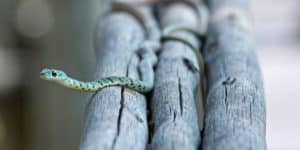
Now that we have clearly established that hamsters themselves neither attract nor deter other rodents, another question comes to mind – what about animals except rodents?
Do hamsters attract non-rodents, for instance, snakes?
You’ll be relieved to know that they actually don’t. It is highly unlikely that your hamster’s scent would reach the outdoors and cause predators or snakes to come looking for it.
While your hamster itself may not attract other animals, bad hygiene practices on your part may cause your home to become a breeding ground for bugs and pests.
Improper or infrequent cleaning of your hamster’s cage or bedding may cause insects and parasites to fester. [2]
Around your hamster’s enclosure, any food particles or spills that aren’t cleared up may attract a number of hungry house pests looking for food.
As for your hamster itself, it’s quite innocent. They prefer no company as it is, so attracting other animals doesn’t make sense anyway. As for attracting predators, that’s a whole other story for hamsters that live in the wild.
How to Deal With Pests
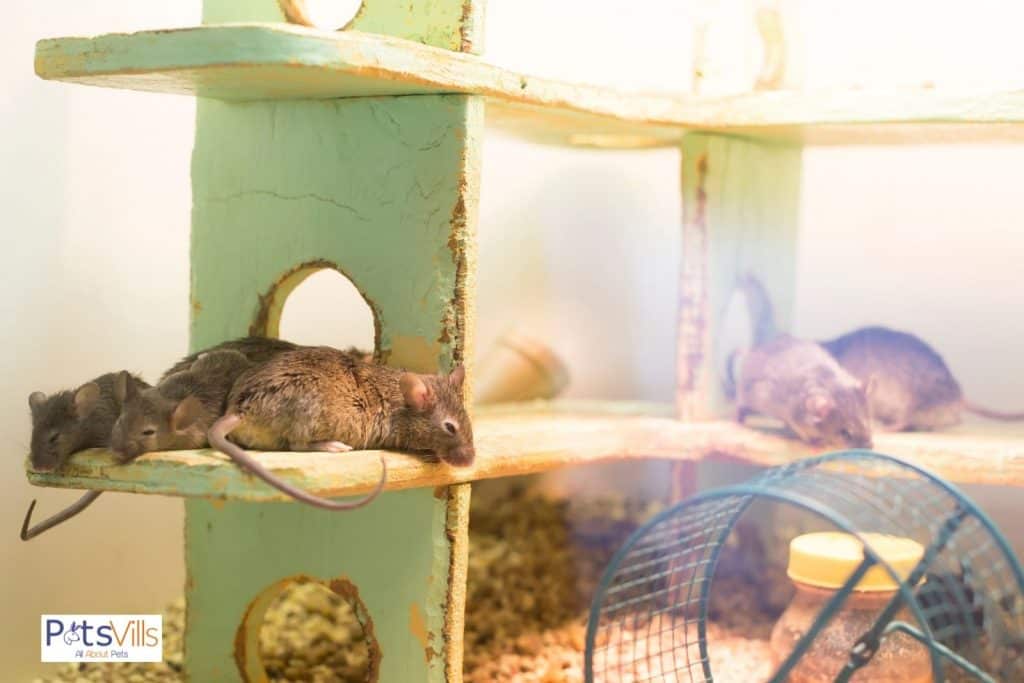
Whether you have an entire pest infestation or have spotted a mouse or two, it can be quite unsettling. These unwelcome creatures can get out of control if not taken care of soon.
Stray mice can even spread diseases. What’s worse is that your hamster may pick up the infections in case it encounters and attacks a mouse.
You can get rid of pests by yourself if you’re smart enough. Some people may not want to go through the extra hassle, though, and may call in professionals.
Sometimes, all your efforts to get rid of pests by yourself go in vain. That’s when you can call in professionals to deal with the matter.
Basic Pest Control
If you’re hero enough to take care of this problem on your own, give it a try. You can use humane mouse traps around your house to get rid of these rodents. [3]
As for insects and bugs, a number of pesticides are available out there, mostly as sprays or powders.
It is important to read the directions and precautions of any animal poison before using it around your house. Don’t hesitate to consult a professional in case it seems tougher than you thought it would be.
Consider Calling a Professional
When you have a serious infestation of an entire colony of pests, it is often better to call professionals. Although it may not be impossible to deal with on your own, it will require a lot of your time and effort.
Pest control agencies often offer a warranty in case the area they treat doesn’t fully clear up in the first go. This will save you a lot of hassle dealing with recurring infestations.
Pest control and fumigation agencies out there are equipped with strong chemicals and vast knowledge to get rid of a wide variety of creatures.
Once you decide to avail of the services of these professionals, let them know that you have pets. This way, they can make the procedure pet-safe.
When you hire a pest control team, listen closely to their instructions.
Since poisonous chemicals used for pest control can be harmful to humans as well, precautions will be required on your part. Pay heed to what your role is going to be, and follow it for your own safety.
It is better to take your hamster to a safe space free from the pest-treatment zone. Once your house is pest-free, you can go back to living in peace with your furry friend.
How to Stop Pests from Coming In
Now that you know the reasons why pests show up, you need to stop them from existing in the first place!
Any openings, cracks, or crevices in walls, windows, or doors should be sealed. That way you’re blocking potential entryways for pests.
To prevent pests from getting attracted to your home and deciding to stay, you need to check your food storage habits too. Enclose food items in airtight containers or sealed pouches after use.
Set a single place in the house for your meals every day that can be cleared properly before you go to sleep.
Snacking around the house can leave crumbs. This can act as an open invitation for bugs, rats, or pests that would like to infest your home.
Trash cans left open outside are a very inviting scenario for rodents to party. Why call them at your door and risk getting them inside once the party’s over?
Once your house is sealed of cracks and crevices and smelling fresh and food-free, there won’t be a reason for any pests to join you.
Make Sure to Keep Your Hamster’s Cage Clean
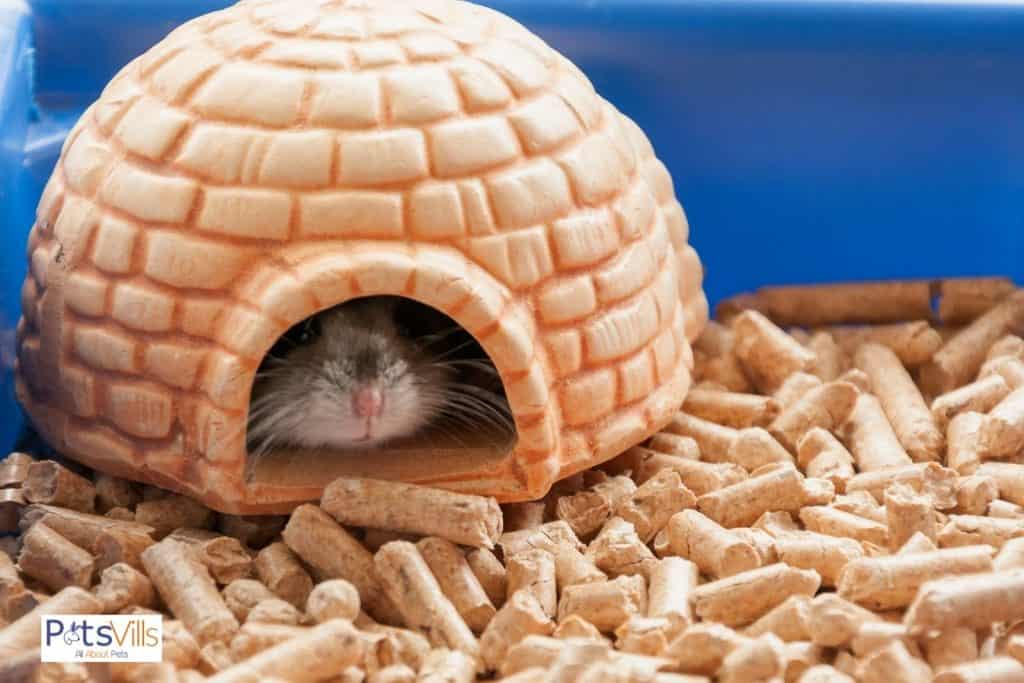
Another thing to keep in mind is regular cleaning sessions of your hamster’s cage. Once a week at least, clean the cage of spills, soiled bedding, and hamster poop.
Before you start cleaning, move your hamster to an alternate cage or exercise ball where it will be safe. A deep container will also work.
Regular soap and warm water are usually enough to clean a hamster’s cage. Rinse it thoroughly and dry it before placing the bedding.
It is equally important to clean around the cage. Any food morsels might make the visiting mice or rats feel welcome in your home! Clear away any spilled poop too, since it may attract germs and bugs.
Proper Hamster Care
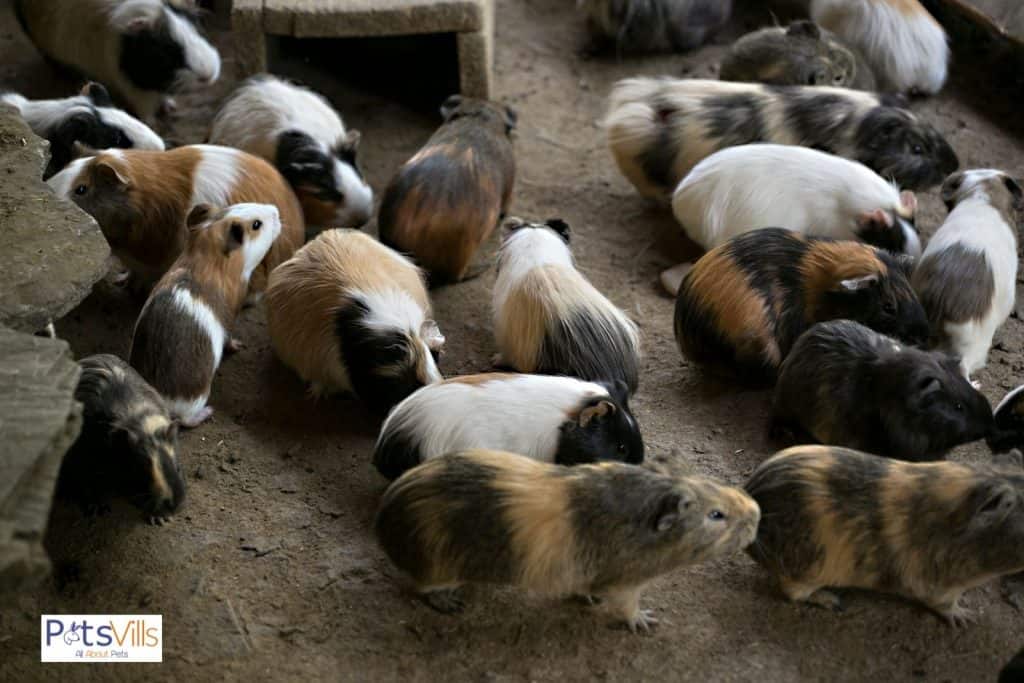
One of the most important hamster care tips is to avoid keeping your hamster in dark, unoccupied rooms. Such rooms are favorites of house pests, so keep your pet safe in a room you visit often.
Rooms to avoid include shady storerooms, basements, attics, or garages. Your hamster may not be human, but it is a living, breathing creature that needs care.
Provide your hamster with soft bedding. Cellulose or paper fibers that are plant-based are the best bedding materials for your hamster. In our best hamster bedding article, we cover the best and worse types of beddings.
Replace any soiled parts of the bedding with new material. Hamsters grow accustomed to their own scent in their bedding. Replacing with a fresh one can at once get disturbing for them, so it’s better to only replace the soiled parts.
If you want your hamster to stay healthy, allow it to exercise too. Install a hamster wheel in its cage. You may also let it free in a closed room to run around as you supervise.
You should be playing and bonding with your hamster daily. If you don’t feel safe with them running freely around your room, you can buy a hamster ball to place them in.
Make sure you are keeping an eye on them and close off any hazards such as entry to stairways. Hamsters have been known to roll downstairs while in these balls and injure themselves.
Hamsters don’t eat anything and everything. They are prone to diabetes, so even fruits should be given sparingly.
Hamster mixes are commercially available and ready to be eaten by your pet. You can provide foods yourself at home too, like fruits, vegetables, and seeds.
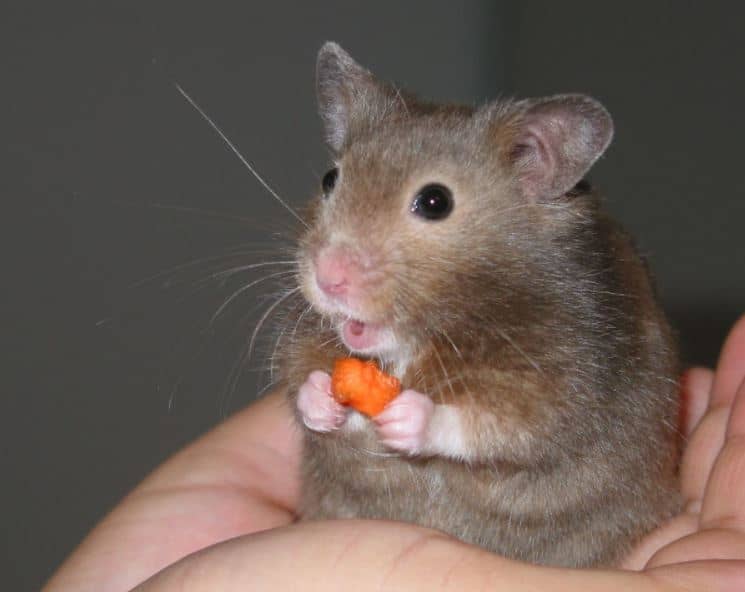
Apples, broccoli, carrots, parsley, peas, and turnips are good hamster foods. Avoid foods like onions, garlic, chives, raw potatoes, oranges, and leeks.
READ MORE: Can Dwarf Hamsters Eat Apples?
For extra precaution against any lurking house pests, you can cover your hamster’s cage with mesh. This way you can make sure that no rodents have a chance of squeezing in and disturbing your introverted pet.
FAQs
Do hamsters keep mice away?
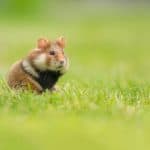
Hamsters don’t keep mice away nor do they attract them.
Do hamsters attract cockroaches?
Just like mice hamsters do not attract nor attract cockroaches.


References
- 1. UFO Themes. SMALL RODENT BEHAVIOR: MICE, RATS, GERBILS, AND HAMSTERS [Internet]. Veterian Key. 2016 [cited 2021 Nov 30]. Available from: https://veteriankey.com/small-rodent-behavior-mice-rats-gerbils-and-hamsters/
- 2. Borji H, Khoshnegah J, Razmi G, Amini H, Shariatzadeh M. A survey on intestinal parasites of golden hamster (Mesocricetus auratus) in the northeast of Iran. Journal of Parasitic Diseases [Internet]. 2013 [cited 2021 Nov 30];38:265–8. Available from: https://www.ncbi.nlm.nih.gov/pmc/articles/PMC4087323/
- 3. Rodents [Internet]. Orst.edu. 2021 [cited 2021 Nov 30]. Available from: http://npic.orst.edu/pest/rodent.html
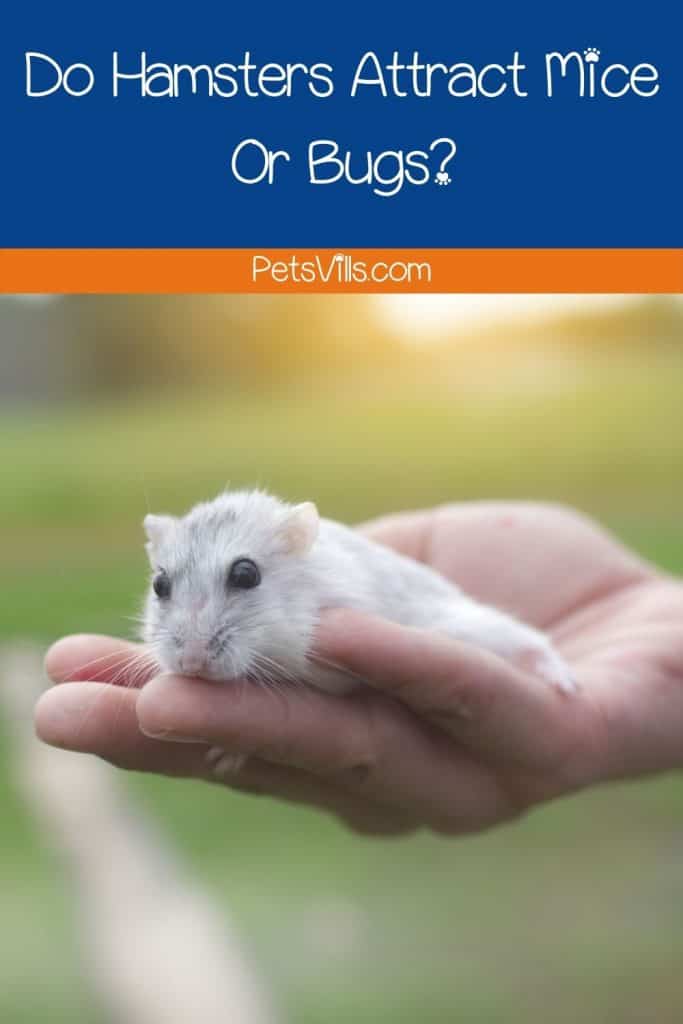
Do hamsters attract mice? Let us know your opinion on this topic below!
Olfa knows how to get things done and has a keen business sense that others admire. She’s always on the go, coming up with new ideas! Her ability to anticipate the needs of her readers and deliver information that they want is what makes CatVills such a success. She loves cuddling her cat Picaciu. He is her inspiration.
Find her on: LINKEDIN
Read her latest articles HERE
Learn more about her

